AI-Driven Strategies to Improve Retail Customer Service

AI is revolutionizing how you interact with customers in retail, particularly through retail AI customer service solutions. It automates routine tasks, predicts customer preferences, and personalizes shopping experiences. For example, Sephora's Virtual Artist tool allows users to try makeup virtually, enhancing satisfaction and reducing returns. By 2025, 80% of companies plan to adopt AI-powered chatbots, while 35% already use AI to boost service efficiency. These tools not only improve customer experience but also streamline operations. Platforms like Sobot unify customer interactions, enabling faster responses and tailored support. With Sobot's AI capabilities, you can transform your retail service into a seamless, customer-centric experience.
Understanding Retail AI Customer Service
What is AI in Retail Customer Service?
Definition and core features of AI in retail customer service.
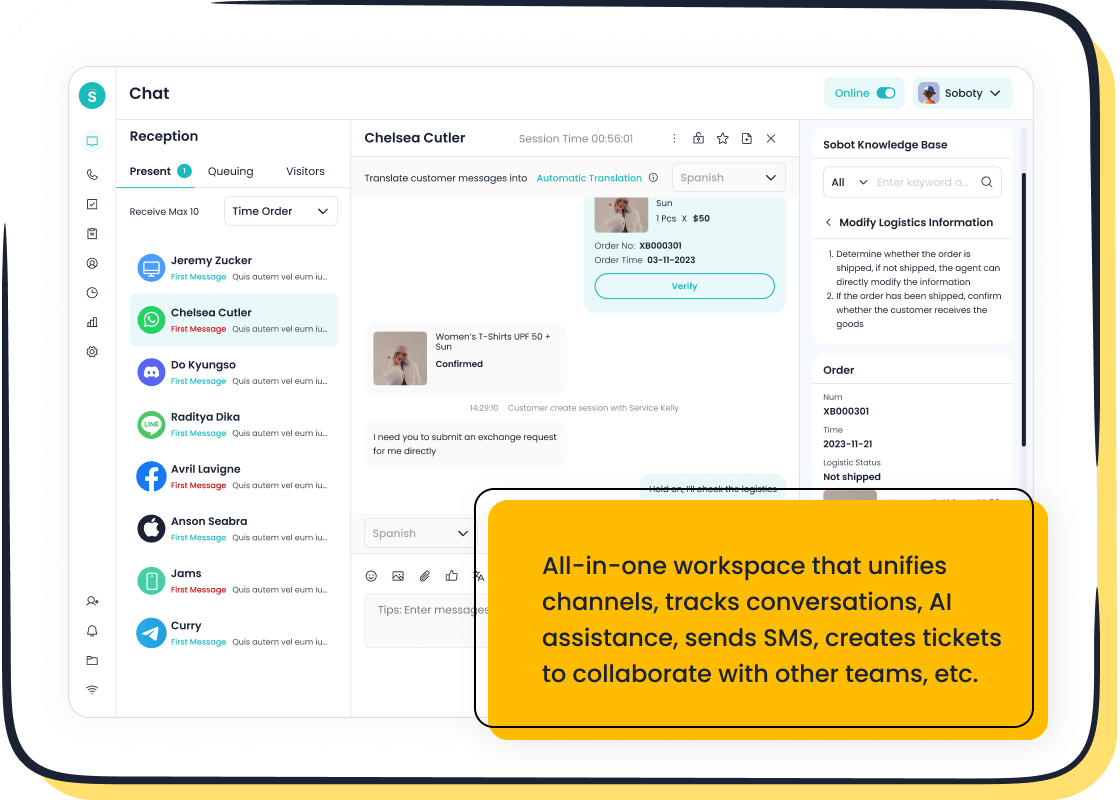
AI in retail customer service refers to the use of artificial intelligence technologies to enhance how you interact with customers. It automates repetitive tasks, provides instant responses, and personalizes retail experiences. Core features include chatbots, predictive analytics, and AI-powered tools that analyze customer data to deliver tailored solutions. For example, Sobot Live Chat uses AI to unify customer interactions across platforms like WhatsApp, Facebook, and Instagram, ensuring seamless communication.
AI tools also offer multilingual support, auto-translation, and intelligent assignment of tasks. These features improve efficiency and ensure that your customers receive timely and accurate assistance. Unlike traditional methods, AI operates 24/7, providing uninterrupted service and reducing wait times.
How AI differs from traditional customer service methods.
AI in retail differs significantly from traditional customer service. Traditional methods rely heavily on human agents, which can lead to delays during peak times. AI, on the other hand, handles high volumes of inquiries simultaneously. For instance, AI chatbots resolve routine questions instantly, freeing up human agents for complex issues. This approach not only improves response times but also enhances the overall shopping experience.
Moreover, AI-driven systems analyze customer behavior to predict needs, something traditional methods cannot achieve. This predictive capability allows you to offer personalized marketing and recommendations, fostering stronger customer relationships.
Benefits of AI in Retail
Enhancing customer experience through personalization.
AI transforms the customer experience by delivering personalized marketing and tailored solutions. It analyzes shopping patterns, preferences, and past interactions to recommend products that align with individual needs. For example, AI tools can suggest items based on a customer’s browsing history, creating a more engaging shopping experience. Over 70% of retailers using AI report improved customer satisfaction, highlighting its effectiveness in personalization.
Improving efficiency and reducing response times.
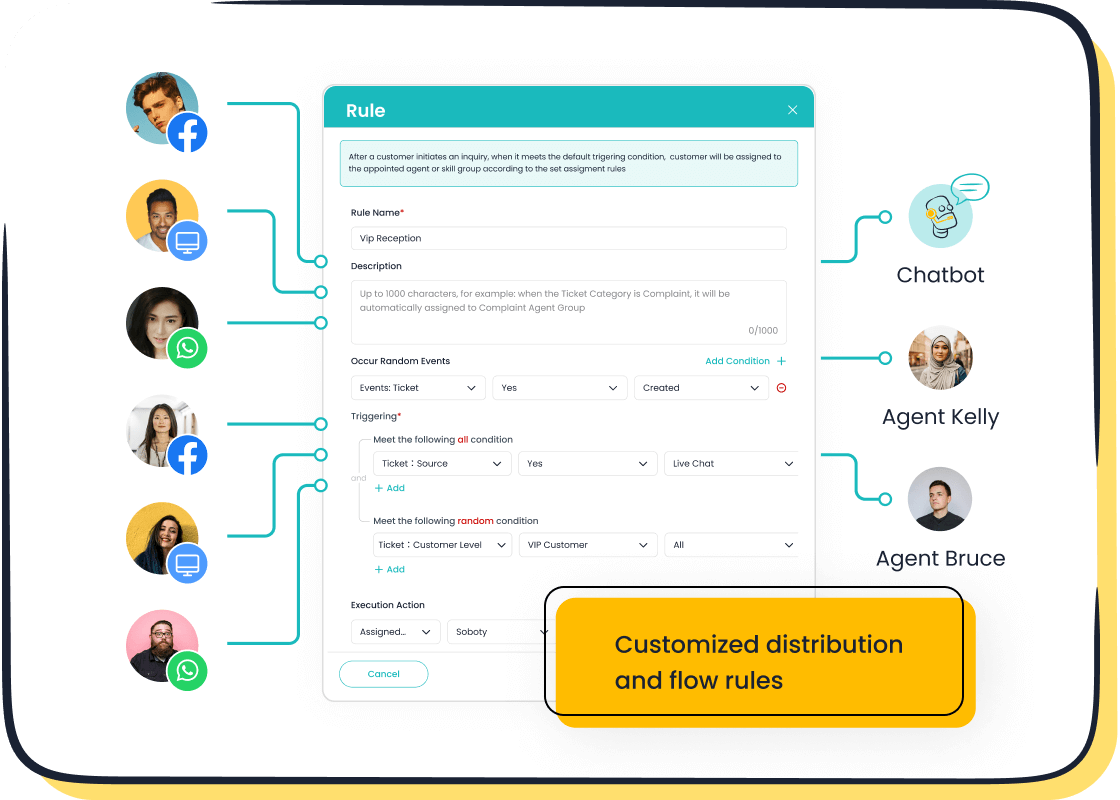
AI boosts efficiency by automating repetitive tasks and streamlining operations. According to McKinsey, AI can increase productivity in customer service by up to 30%. Tools like Sobot Live Chat integrate customer data into a unified workspace, enabling agents to respond faster and more accurately. This reduces response times and ensures that your customers receive the support they need without delays.
Trends in AI Adoption
Popular AI tools transforming retail customer service.
AI tools like chatbots, virtual assistants, and predictive analytics are revolutionizing retail customer service. Sobot Live Chat, for instance, supports omnichannel communication and uses AI to analyze over 150 indicators for service optimization. These tools not only enhance customer interactions but also improve operational efficiency. By 2025, AI is expected to power 95% of customer interactions, underscoring its growing importance.
Industries leading the way in AI implementation.
Retail is one of the leading industries adopting AI, with 63% of companies already using it to enhance customer service. Other sectors like financial services and gaming are also leveraging AI to improve customer engagement. The AI retail market is projected to reach $31.18 billion by 2028, growing at a CAGR of 24.8%. This rapid adoption highlights the critical role of AI in shaping the future of customer service.
Key AI-Driven Strategies for Retail

Personalizing the Customer Experience
Leveraging AI to analyze customer behavior and preferences.
AI in retail enables you to analyze customer behavior and preferences effectively. By categorizing customers based on demographics, buying habits, and interests, AI-powered tools help you create targeted marketing campaigns. For instance, Amazon uses AI to power its recommendation engine, which significantly boosts sales by offering personalized suggestions. Similarly, Sephora employs AI chatbots to provide tailored product recommendations, enhancing customer satisfaction and loyalty. These tools process large volumes of data to uncover patterns, allowing you to personalize customer experiences and anticipate their needs.
Tailoring product recommendations and promotions.
AI-driven personalization transforms how you engage with customers. Tools like Sobot Live Chat unify customer interactions across platforms, enabling you to deliver tailored recommendations seamlessly. For example, Sephora's Virtual Artist app uses AI to suggest products based on individual preferences, creating an engaging shopping experience. The North Face leverages AI to recommend jackets through its Expert Personal Shopper (XPS) tool, ensuring customers find products that match their needs. These strategies not only improve customer experience but also boost consumer loyalty and drive sales.
| Company | AI Application | Outcome |
|---|---|---|
| Amazon | Recommendation engine | Significant sales increase through personalization |
| Sephora | Virtual Artist app | Enhanced shopping experience with tailored suggestions |
| The North Face | Expert Personal Shopper (XPS) | Personalized jacket recommendations |
Predictive Analytics for Proactive Support
Anticipating customer needs and reducing churn.
Predictive analytics helps you anticipate customer needs and reduce churn. By analyzing historical and current data, AI tools identify patterns and build predictive models. These insights allow you to address potential issues before they escalate. For example, understanding common reasons for churn, such as unmet expectations or product failures, enables you to implement proactive retention strategies. This approach strengthens customer relationships and ensures long-term loyalty.
Using AI to optimize inventory and pricing strategies.
AI in retail enhances inventory and pricing strategies by providing data-driven insights. Predictive analytics minimizes stockouts and overstock situations, reducing holding costs and waste. It also enables dynamic pricing models that adjust based on demand and competition. For example, AI tools empower you to forecast demand accurately, ensuring the right products are available during peak periods. This optimization improves decision-making and strengthens vendor relationships, ultimately driving profitability.
| Benefit | Description |
|---|---|
| Cost Reduction | Minimizes holding costs and reduces the risk of overstock or stockouts. |
| Improved Forecasting | Anticipates future demand accurately, reducing stockouts during peak periods and surplus inventory. |
| Enhanced Decision-Making | Empowers decision-makers with data-driven insights for strategic inventory management. |
| Minimized Stockouts | Reduces occurrences of stockouts, preventing lost sales opportunities. |
| Strategic Vendor Relationships | Improves collaboration with suppliers, leading to better negotiation terms and reduced costs. |
Chatbots and Virtual Assistants in Retail
Automating routine inquiries with AI-powered chatbots.

AI-powered chatbots revolutionize retail customer service by automating routine inquiries. These tools handle up to 80% of repetitive tasks, saving businesses approximately 2.5 billion hours of work by 2024. Chatbots provide 24/7 availability, ensuring customers receive instant responses. For example, Sobot Live Chat utilizes a chatbot to address common questions, freeing human agents to focus on complex issues. This approach enhances efficiency and improves the overall customer experience.
Enhancing 24/7 customer support with tools like Sobot Live Chat.
AI-powered approaches like Sobot Live Chat ensure seamless 24/7 customer support. Companies using AI-driven systems experience a 71% reduction in first response times. For instance, H&M reduced its average response time from 2 hours to 30 minutes by implementing AI chatbots. Sobot Live Chat integrates customer data into a unified workspace, enabling agents to provide timely and accurate assistance. This combination of AI and human expertise boosts customer satisfaction and fosters loyalty.
Tip: Utilizing a chatbot like Sobot Live Chat not only improves response times but also ensures scalability and efficiency in handling customer inquiries.
Data-Driven Insights for Continuous Improvement
Using AI analytics to identify trends and gaps in service.
AI analytics empowers you to uncover trends and gaps in retail service, enabling continuous improvement. By analyzing customer data, AI tools provide actionable insights that help you refine your strategies. For instance, personalization becomes more effective as AI adapts in-store displays and services based on customer profiles. This enhances the overall customer experience and fosters loyalty.
Retailers like Zara use AI to predict trends by analyzing social media and customer data. This allows them to design and produce trendy items faster, staying ahead of competitors. Walgreens leverages AI to optimize inventory and provide personalized health recommendations, ensuring essential items are always available during peak seasons. These strategies not only improve service efficiency but also boost customer satisfaction.
According to reports, 69% of retailers have seen increased annual revenue due to AI adoption. Additionally, 72% of those using AI report reduced operating costs. McKinsey projects that AI could generate $310 billion for the retail sector by enhancing digital customer interactions. These figures highlight the transformative potential of leveraging AI analytics in retail.
Leveraging customer feedback for service optimization.
Customer feedback is a goldmine for improving retail service. AI-driven systems analyze real-time feedback to identify common pain points and areas for improvement. This allows you to implement targeted strategies that enhance the shopping journey. For example, AI tools process satisfaction surveys to reveal insights that improve the customer experience.
By addressing concerns quickly, you can build trust and loyalty. AI also helps you prioritize improvements by identifying the most impactful changes. For instance, if feedback highlights long wait times, AI analytics can suggest optimizing staffing or implementing chatbots like Sobot Live Chat. This tool integrates customer data into a unified workspace, enabling faster responses and better service delivery.
Retailers using AI to analyze feedback often see significant improvements in customer satisfaction. By leveraging these insights, you can create a seamless and enjoyable shopping experience that keeps customers coming back.
Balancing AI and Human Interaction in Customer Service
The Role of Human Empathy
Why human interaction remains critical in customer service.
AI has transformed retail customer service, but human interaction still plays a vital role. While AI excels at automating tasks and providing instant responses, it lacks the emotional intelligence needed to handle sensitive situations. For example, when a customer faces a frustrating issue, a human agent can empathize and offer reassurance. This emotional connection builds trust and strengthens the customer experience.
Human agents also excel in understanding nuanced requests that AI might misinterpret. For instance, a customer describing a unique problem with a product may require a personalized solution that only a human can provide. These scenarios highlight why human empathy remains indispensable in retail strategies.
Scenarios where human agents are indispensable.
Certain situations demand human involvement to ensure effective service. Complex issues, such as resolving disputes or handling high-value transactions, often require a human touch. For example, a customer disputing a billing error may feel more confident speaking with a person who can explain the resolution process clearly. Similarly, luxury retail brands often rely on human agents to deliver a premium, personalized experience that AI cannot replicate. These scenarios demonstrate the importance of balancing AI with human expertise.
Creating a Hybrid Approach
Combining AI tools like Sobot Live Chat with human expertise.
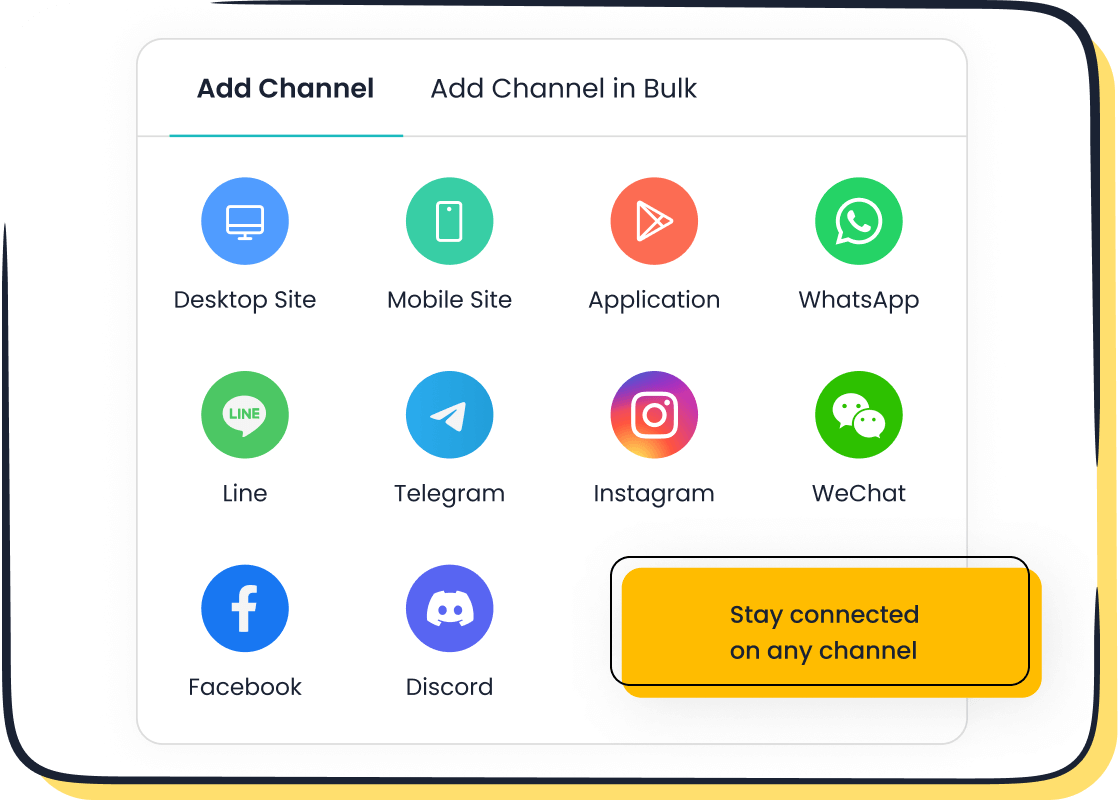
A hybrid approach combines the efficiency of AI with the empathy of human agents, creating a seamless customer service experience. Tools like Sobot Live Chat automate routine tasks, such as answering FAQs or processing orders, allowing human agents to focus on more complex issues. This collaboration enhances operational efficiency and improves customer satisfaction.
| Aspect | Evidence |
|---|---|
| Customer Service | AI enhances customer service through hyper-personalized shopping experiences. |
| Operational Efficiency | AI streamlines inventory processes, reducing waste and ensuring product availability. |
| Revenue Growth | AI enables dynamic offers and real-time engagement, fostering customer loyalty and sales. |
| Task Automation | AI automates manual tasks, allowing employees to focus on high-value activities. |
Retailers adopting this strategy often see significant benefits. For instance, AI-driven personalization can increase revenue by 10-15%, while AI-powered inventory management reduces stockouts by 30-50%. These results highlight the effectiveness of integrating AI tools like Sobot Live Chat into your retail strategies.
Training staff to collaborate effectively with AI systems.
To maximize the benefits of a hybrid approach, training your staff to work alongside AI systems is essential. Employees should understand how to use AI tools to enhance their productivity and improve customer interactions. For example, training agents to navigate Sobot Live Chat’s unified workspace enables them to access customer data quickly, ensuring accurate and timely responses.
| Statistic Description | Value |
|---|---|
| Average monthly savings from AI agents | $80,000 savings |
| Revenue increase from AI-driven personalization | 10-15% increase |
By equipping your team with the right skills, you can create a collaborative environment where AI and human expertise work together seamlessly. This approach not only improves service efficiency but also enhances the overall customer experience.
Overcoming Challenges in AI Implementation
Addressing Common Obstacles
Managing high initial costs and resource requirements.
Implementing AI in retail often involves significant upfront costs. These expenses include purchasing software, integrating systems, and training employees. For example, off-the-shelf AI tools like chatbots may cost between $50 and $300 per month for basic versions, while advanced solutions can reach up to $100,000 annually. Custom AI solutions, such as predictive analytics, may require an investment of $50,000 to $500,000 or more, with additional maintenance costs of 15–20% annually. Retailers also face infrastructure expenses for hardware and cloud computing.
| Category | Examples | Cost Range | Best For |
|---|---|---|---|
| Off-the-Shelf AI Tools | Chatbots, recommendation engines | $50–$300/month; $10,000–$100,000/year | Small to medium-sized retailers |
| Custom AI Solutions | Predictive analytics | $50,000–$500,000+ | Large retailers with specific needs |
| AI Implementation Services | IBM Watson, Google AI | $50,000–$250,000 | Retailers needing end-to-end support |
To manage these costs, you can start small by adopting scalable tools like Sobot Live Chat, which offers a free trial and affordable pricing options. This approach allows you to test AI capabilities without overwhelming your budget.
Overcoming resistance to change within organizations.
Resistance to change is another common challenge when adopting AI in retail. Employees may fear job displacement, while organizations may struggle to integrate AI with outdated systems. For example, legacy systems often require additional integration efforts to avoid data silos, which can slow down adoption. A lack of necessary skills among staff further complicates the process.
| Resistance Factor | Description |
|---|---|
| Workforce Concerns | Employees fear job displacement or role changes due to AI integration. |
| Integration with Legacy Systems | Outdated systems require additional efforts to incorporate AI solutions. |
| Cultural Barriers | Risk-averse cultures may resist adopting new technologies like AI. |
To address these issues, you should focus on transparent communication and provide training programs. Highlight how AI tools like Sobot Live Chat can enhance employee efficiency rather than replace their roles.
Ethical and Practical Considerations
Ensuring data privacy and security in AI systems.
AI in retail relies on vast amounts of customer data, which raises privacy and security concerns. Retailers must comply with laws like GDPR and CCPA to protect sensitive information. AI systems are also vulnerable to breaches, requiring robust security measures. Misuse of data can damage your brand’s reputation and erode customer trust.
- AI systems must adhere to transparency, accountability, and governance principles.
- Retailers should implement encryption and access controls to safeguard data.
- Compliance with privacy laws ensures ethical AI usage and builds trust.
Sobot Live Chat, for instance, integrates advanced security features to protect customer data, ensuring compliance with global standards.
Avoiding bias in AI algorithms and decision-making.
Algorithmic bias can lead to unfair outcomes, damaging your brand’s image. For example, biased AI recommendations may exclude certain customer groups, reducing inclusivity. To minimize bias, you should prioritize responsible AI practices.
- Regularly audit AI algorithms to identify and correct biases.
- Ensure transparency in how AI systems make decisions.
- Use diverse datasets to train AI models for fairer outcomes.
By adopting these practices, you can build trust and maintain a positive brand reputation.
Scalable Solutions for Retailers
Starting with tools like Sobot Live Chat for gradual adoption.
Gradual adoption of AI in retail minimizes risks and ensures smoother implementation. Start with small-scale pilots, such as deploying Sobot Live Chat in one department or location. This tool offers omnichannel support and AI-powered analytics, making it an excellent starting point for retailers.
| Step | Description |
|---|---|
| Start with Small-Scale Pilots | Test AI on a smaller scale to refine your approach. |
| Monitor Performance | Analyze pilot results to identify successes and areas for improvement. |
| Scale Gradually | Expand AI solutions across the organization after validating their effectiveness. |
This step-by-step approach allows you to assess the impact of AI tools before scaling them across your business.
Educating teams on the benefits of AI in retail.
Educating your team is essential for successful AI adoption. Training programs should focus on how AI tools like Sobot Live Chat can enhance productivity and improve customer interactions. For example, retailers using AI-driven segmentation report a 20–25% increase in marketing ROI. Additionally, AI-powered inventory management reduces stockouts by 30–50%, boosting sales and customer satisfaction.
| Benefit Description | Percentage/Value |
|---|---|
| Increase in annual revenue reported by retailers | 69% |
| Reduction in stockouts with AI-powered inventory management | 30-50% |
| Increase in marketing ROI from AI-based segmentation | 20-25% |
By equipping your team with the right skills, you can maximize the benefits of AI while fostering a collaborative environment.
Real-World Success Stories of AI in Retail
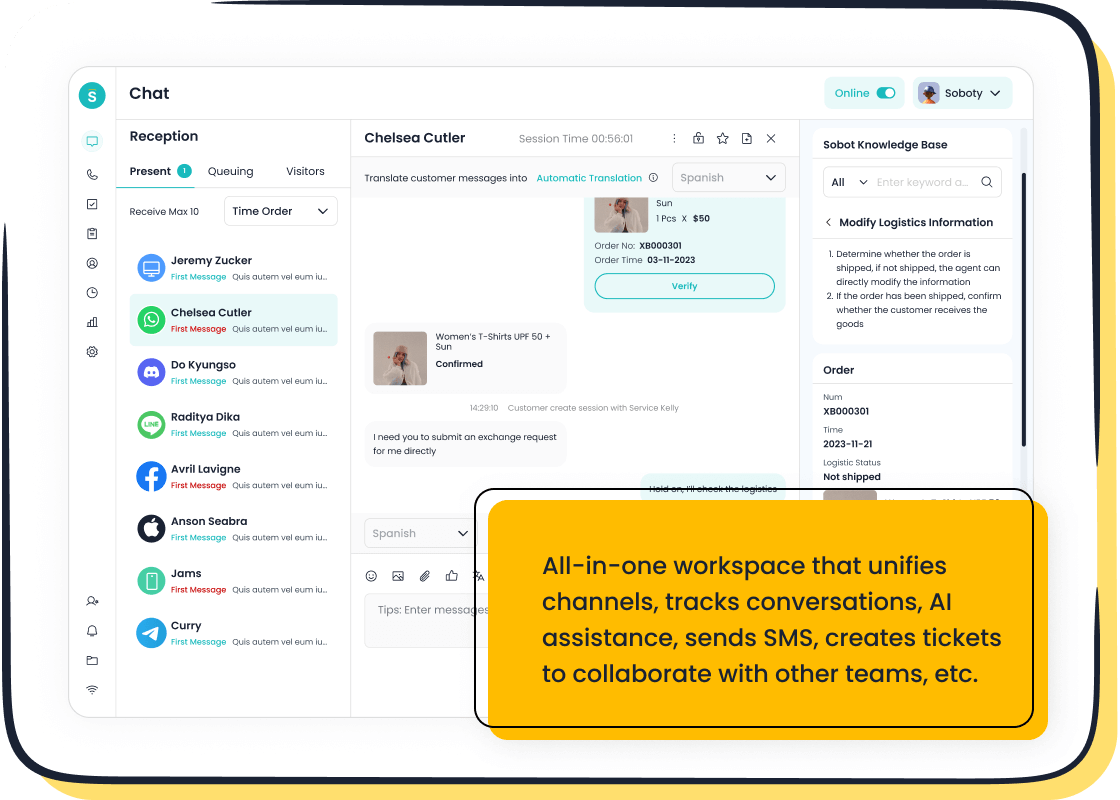
Case Studies of AI in Action
How Sobot helped OPPO achieve an 83% chatbot resolution rate.
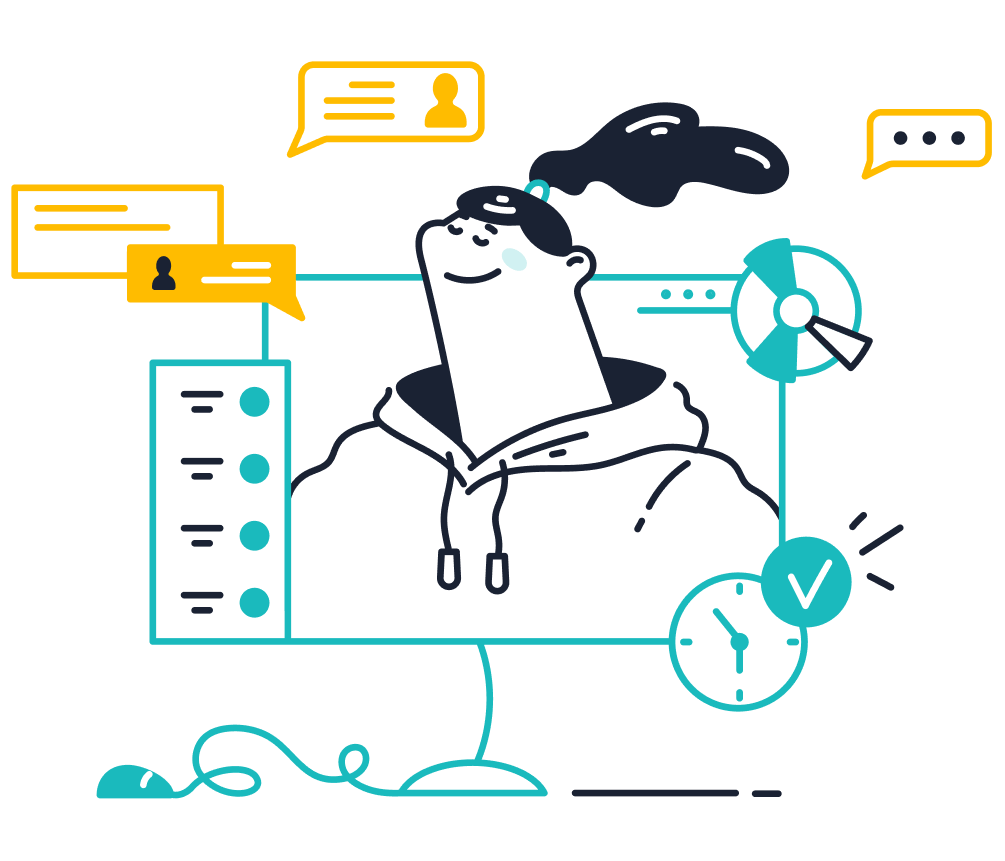
OPPO, a global leader in smart devices, faced challenges during peak shopping periods. High inquiry volumes overwhelmed their customer service team, leading to delays and dissatisfaction. By implementing Sobot's AI-powered chatbot and ticketing system, OPPO transformed its operations. The chatbot handled repetitive queries, allowing human agents to focus on complex issues. This human-machine collaboration improved efficiency and reduced response times.
Sobot also optimized OPPO's knowledge base using AI, cutting maintenance efforts by 90%. The integration of global customer channels and business systems streamlined data access, enhancing service quality. These efforts resulted in an impressive 83% chatbot resolution rate, a 94% positive feedback rate, and a 57% increase in repurchase rates. OPPO's success demonstrates how AI in retail can elevate customer satisfaction and operational efficiency.
Examples of AI-driven personalized shopping experiences.
AI has revolutionized personalized shopping experiences across the retail industry. For instance:
- Zara uses AI to predict trends and adjust pricing dynamically. This approach accelerates the design and production of trendy items, keeping Zara competitive.
- Taco Bell employs AI chatbots to streamline ordering and provide tailored menu suggestions.
- Walgreens leverages AI to offer personalized health recommendations and optimize inventory, ensuring essential items are always available.
- Macy's integrates virtual assistants to enhance product searches and provide accurate suggestions.
These examples highlight how AI empowers retailers to deliver tailored experiences, boosting customer satisfaction and loyalty.
| Brand | AI Application | Key Benefits |
|---|---|---|
| Zara | Trend Prediction, Dynamic Pricing | Faster design and production of trendy items, competitive pricing |
| Taco Bell | Chatbots for Ordering | Streamlined ordering process, tailored menu suggestions |
| Walgreens | Personalized Health Recommendations | Recommendations based on health data, optimized inventory |
| Macy's | Virtual Assistants, Search Enhancement | Improved product location, enhanced online search accuracy, product suggestions |
Lessons from Successful Implementations
Key takeaways for businesses adopting AI strategies.
Successful AI implementations in retail reveal several key takeaways:
- Start small with scalable tools like Sobot Live Chat to minimize risks and costs.
- Use AI to automate repetitive tasks, freeing up human agents for complex issues.
- Leverage AI analytics to identify trends, optimize inventory, and enhance customer experiences.
- Ensure data privacy and security to build trust with your customers.
These strategies help you maximize the benefits of AI while maintaining a customer-centric approach.
How to replicate success using tools like Sobot Live Chat.
To replicate success, focus on integrating AI tools that align with your business goals. Sobot Live Chat offers omnichannel support, AI-powered analytics, and seamless system integration. These features enable you to provide personalized shopping experiences and improve service efficiency. For example, Sobot Live Chat's unified workspace allows agents to access customer data quickly, ensuring timely and accurate responses. By adopting such tools, you can enhance customer satisfaction and drive long-term growth.
Tip: Begin with a free trial of Sobot Live Chat to explore its capabilities and assess its impact on your operations.
AI has revolutionized retail customer service by enhancing efficiency and personalization. It improves customer satisfaction through real-time customization and data-driven insights. For example, businesses using AI have seen their Customer Satisfaction Score rise from 84% to 94%, while reducing repeat contact rates by 45%. However, human interaction remains essential for addressing complex issues and building trust. AI tools like Sobot Live Chat allow you to balance automation with empathy, ensuring a seamless customer experience. By adopting AI-driven strategies, you can elevate satisfaction, streamline service, and stay competitive in the evolving retail landscape.
FAQ
What is AI in retail customer service?
AI in retail customer service uses artificial intelligence to improve how you interact with customers. It automates tasks like answering FAQs, personalizing recommendations, and analyzing customer data. Tools like Sobot Live Chat unify communication channels, ensuring seamless interactions and faster responses. AI enhances efficiency and customer satisfaction.
Example: Sobot Live Chat supports platforms like WhatsApp and Instagram, offering 24/7 service.
How does Sobot Live Chat improve customer service?
Sobot Live Chat boosts customer service by integrating all communication channels into one workspace. It uses AI to analyze customer behavior, enabling personalized responses. Its multilingual support and auto-translation features ensure global accessibility. Businesses using Sobot Live Chat report a 38% increase in conversion rates.
Tip: Start with Sobot Live Chat’s free trial to explore its benefits.
Can AI replace human agents in retail?
AI handles repetitive tasks, but it cannot replace human empathy. For example, chatbots like Sobot Live Chat resolve routine inquiries, while human agents address complex issues. Combining AI with human expertise creates a balanced approach, improving efficiency and customer satisfaction.
Fact: 71% of companies using AI report faster response times.
Is AI in retail customer service secure?
Yes, AI tools like Sobot Live Chat prioritize data security. They comply with global standards like GDPR, ensuring customer information remains protected. Features like encryption and access controls safeguard sensitive data, building trust with your customers.
Note: Always choose AI solutions with robust security measures.
How can small retailers adopt AI affordably?
Small retailers can start with scalable tools like Sobot Live Chat. It offers affordable pricing and a free trial, making it easy to test AI capabilities. Gradual adoption minimizes risks and ensures smoother integration into your operations.
Statistic: Retailers using AI see a 20-25% increase in marketing ROI.
See Also
Enhancing Productivity With AI-Driven Customer Support Tools
Excelling in Live Chat for Retail Success
Transforming Support Services With AI Customer Agents
Increasing E-commerce Satisfaction Through Effective Chatbots
A Guide to Establishing Omnichannel Contact Center Strategies
